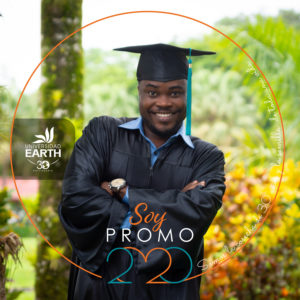Not your average class projects
Before getting to wear a ceremonial cap and gown, each fourth-year student at EARTH University must successfully present their graduation project. With the culmination of a full year of academic research under faculty mentorship, each project seeks to solve a real-world challenge. Continue reading to learn about three of these efforts, each focused on generating new, actionable knowledge the potential to benefit farmers and developing communities across the globe.
Solving uncertainty in fruit production
Student: Bleck Tita
Project: “Development of a systematic ripening estimator for bananas”
Adviser: Víctor Hugo Morales Peña
Mastercard Foundation Scholar Bleck Tita (’20, Cameroon) began making initial plans for his graduation project during his second year at EARTH. He was intrigued about the supply-chain logistics of guanabana (aka soursop), a fruit of great importance to the Cameroonian economy – but also one that poses commercialization challenges, due to its erratic ripening habits and its fragility when handled.
“I built a prototype, one adaptable to different fruit-ripening chambers, that can tell the producer the precise moment when a particular load is ready to be exported and sold,” Bleck says. “The model measures the percentages of water and sugar present in the fruit. I innovated upon an existing process, to boost production efficiency.”
Thanks to a post-graduation fellowship from the Mastercard Foundation, Bleck will be paid to implement his ripening estimator in Cameroon, where he will collaborate with the International Institute of Tropical Agriculture, a research nonprofit seeking solutions to poverty, hunger, and the degradation of natural resources in Africa.
“EARTH has fostered the passion I feel for what I do, which means I don’t mind working long hours. I love sharing the knowledge I have learned,” Bleck adds. “This passion moves me to look beyond short-term results, focusing instead on permanent solutions to the problems we face.”
Solving the scourge of microplastics
Student: Fiorella Guzmán
Project: “Biodegradation of LDPE with microorganisms present in Galleria mellonella (Linnaenus, 1756)”
Adviser: Bert Kohlmann
To Fiorella Guzmán (’20, Costa Rica), being an “EARTHian” amounts to daily acts of leadership undertaken, both personally and professionally, to make the world a better place. During her third year, she interned at the Agricultural Microbiology Laboratory at Universidad de Costa Rica, where she researched the larvae of wax moths (Galleria mellonella). She noticed that the plastic dish holding them was falling apart – seemingly eaten. Curious, she decided to experiment, eventually observing how the larvae, indeed, had the ability to consume low-density polyethylene.
Fiorella extracted microorganisms from the larvae’s digestive tract to evaluate their ability to decompose LDPE (plastic No. 4), the notoriously hard-to-recycle material, commonly produced to make disposable products like shopping bags and food containers.
“The results revealed an effect. On average, biodegradation increased from 0.54 percent to 2.26 percent,” Fiorella says. “It’s not much, but it’s something – and important. The subject should continue to be studied, to see if the bacteria concentration can be increased. I firmly believe a product that gradually removes microplastics from soil or water could be created.”
Solving rural water scarcity
Student: Carmen de León López
Project: “Establishing irrigation criteria using remote-sensing tools in Guatemala”
Adviser: Carlo Magno Soto Castro
During the first two years of her degree, Mastercard Foundation Scholar Carmen de León López (’20, Guatemala) was interested in traditional community development and environmental management, rather than issues of computer-powered agribusiness innovation. In her third year, she traveled to South Africa to intern at the University of Cape Town, where she worked on implementing remote-sensing and GIS projects – and, in the process, became convinced that technology can positively impact communities and the environment.
Carmen dedicated her graduation project to amassing satellite images and building historical climate databases that can be programmed to generate evapotranspiration projections for the years 2021 through 2040. By contrasting the loss of water – from plants, soil, and more, through vapor – with the amount of rainfall in different microclimates of Guatemala, it is possible to find better ways to irrigate and distribute water throughout the country. Although Carmen focused her study on Guatemala, the system she created can be replicated anywhere in the world.
“Looking ahead, my main takeaway from this experience is to always strive to learn about everything I can,” Carmen says. “At first, I had outright dismissed high technology. But I later came to understand that one can – and should – embrace new knowledge because there is often a use for it.”
Bleck, Fiorella, Carmen, and 101 others are part of our resilient Class of 2020, a cohort that inspiringly adapted to increased restrictions and conducted meaningful research amid a global pandemic.







